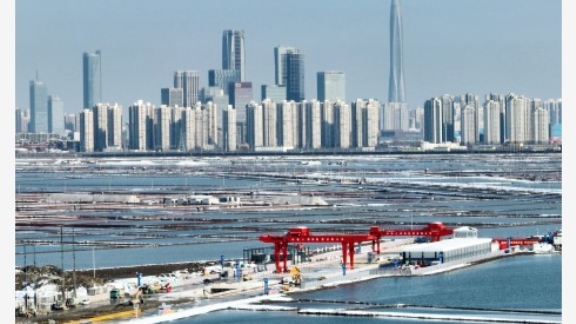China's factory activity showed improvement this month as companies reported strong production and maintained an overall optimistic outlook, adding to growing evidence that China's economy is off to a strong start this year.
China's manufacturing purchasing managers' index (PMI) stood at 49.2 in January 2024, up from 49 in December last year, official data showed on Wednesday.
The figure rebounds from a three-month decline that began in October 2023 and shows improvement in manufacturing activity, according to data released by the National Bureau of Statistics (NBS). The PMI for December, November, and October was 49, 49.4, and 49.5, respectively.
Measurements above 50 indicate expansion, and measurements below 50 indicate contraction.
Zhang Liqun, special analyst at the China Logistics and Purchasing Federation, said the recovery in the PMI indicates an increase in supporting factors for the economy and contributes to economic stability, adding that since the authorities started the economic stimulus package, He pointed out that Japan is stepping up efforts to support the economy. Year.
NBS senior statistician Zhao Qinghe said factory production outlook was stable in January, but production accelerated this month and new orders increased.
A sub-index measuring manufacturing production rose to a four-month high, led by a strong food and beverage sector, entertainment and pharmaceutical production. Export orders recorded a significant improvement reflecting the recovery in external demand, and new orders continued to expand not only for consumer goods but also for equipment and high-tech manufacturing.
The business outlook was largely stable, with continued expectations for pharmaceutical, automotive, and railway and marine equipment manufacturers in high-climate regions.
PMI for large companies has returned to expansion territory, while medium-sized companies have improved but are still in contraction territory. The situation remained lackluster for small and medium-sized enterprises.
Wednesday's data also showed that the country's non-manufacturing activity, particularly the services and construction sectors, accelerated its expansion in January, with a PMI of 50.7, up from 50.4 in December.
Zhao said the holidays in early January increased people's willingness to travel and spend, leading to higher activity levels in the retail, road transport, air transport and catering sectors.
The Chinese economy started the new year on a strong note, ending 2023 with an impressive growth rate of 5.2%.
A warm atmosphere spread across the country, evident in the bustle of tourist attractions and long lines at restaurants. Tourism revenue in China during the New Year three-day holiday exceeded pre-pandemic 2019 levels, and box office revenue hit a record high. Travel and sales are expected to surge further with the upcoming Chinese New Year.
But experts still warn of difficulties and challenges facing the economy, including a lack of effective demand and weak social expectations. Zhang said further efforts are needed to boost domestic demand through government investment to promote the economy's upward trend.

